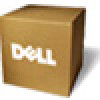Dell Precision M40 Dell Precision Mobile Workstation M40 User's Guide - Page 8
External Monitor, Parallel Devices, Docking Devices, USB Devices, Mouse, External Keyboard, - video driver
 |
View all Dell Precision M40 manuals
Add to My Manuals
Save this manual to your list of manuals |
Page 8 highlights
External Monitor You can attach an external monitor to the video connector. NOTICE: Do not place the monitor directly on top of your mobile workstation computer, even if it is closed. Doing so can crack the computer case and the display. 1. Make sure that the external monitor is turned off. Set the monitor on a monitor stand, desktop, or other level surface near your computer. 2. Connect the external monitor's video cable to the computer. Be sure to tighten all the screws on the video cable connector(s) to eliminate radio frequency interference (RFI). 3. Connect your external monitor to a grounded electrical outlet. If the monitor's power cable is not permanently attached to the monitor, connect it to the monitor. Using an External Monitor When an external monitor is connected to the computer, the video image appears on the external monitor's screen when you boot your computer. Press to switch the video image to the next display in the following sequence: the computer's display, the display and external monitor simultaneously, or an external monitor. Press on an external keyboard if the External Hot Key option is enabled in the system setup program. If the external monitor is turned off when you boot your computer, the computer still sends the video image to the external monitor, but you will not see an image on either the computer's display or the external monitor. To see an image, turn on the external monitor or switch the video image to the computer's display. NOTE: If you are using your external monitor at a resolution greater than the display supports, the simultaneous display feature is disabled. Parallel Devices You can attach a parallel device (usually a printer) to the parallel connector. Docking Devices You can attach a Dell docking device to the docking connector. For information on docking your computer, see the documentation that came with your docking device. USB Devices You can attach USB-compatible devices such as a mouse, keyboard, printer, or scanner to a USB connector. Mouse, External Keyboard, and External Numeric Keypad You can attach a mouse, 101- or 102-key keyboard, or numeric keypad to the Personal System/2 (PS/2) connector. Mouse If the Pointing Device option in the system setup program is set to Touch Pad-PS/2 Mouse (the default), you can use both the DualPoint device and an external PS/2-compatible mouse if one is attached. If you disconnect the mouse, to use the advanced features of the DualPoint device, you must shut down the computer or enter standby mode and then resume. If you do not do this, the DualPoint device resumes operation in standard PS/2 mode, which means that many of the configuration features are disabled. If you are using a PS/2-compatible mouse that is not made by Microsoft and the mouse does not work properly, reboot the computer. If the mouse still does not work, install the drivers from the floppy disk or CD that came with the mouse and reboot the computer.















